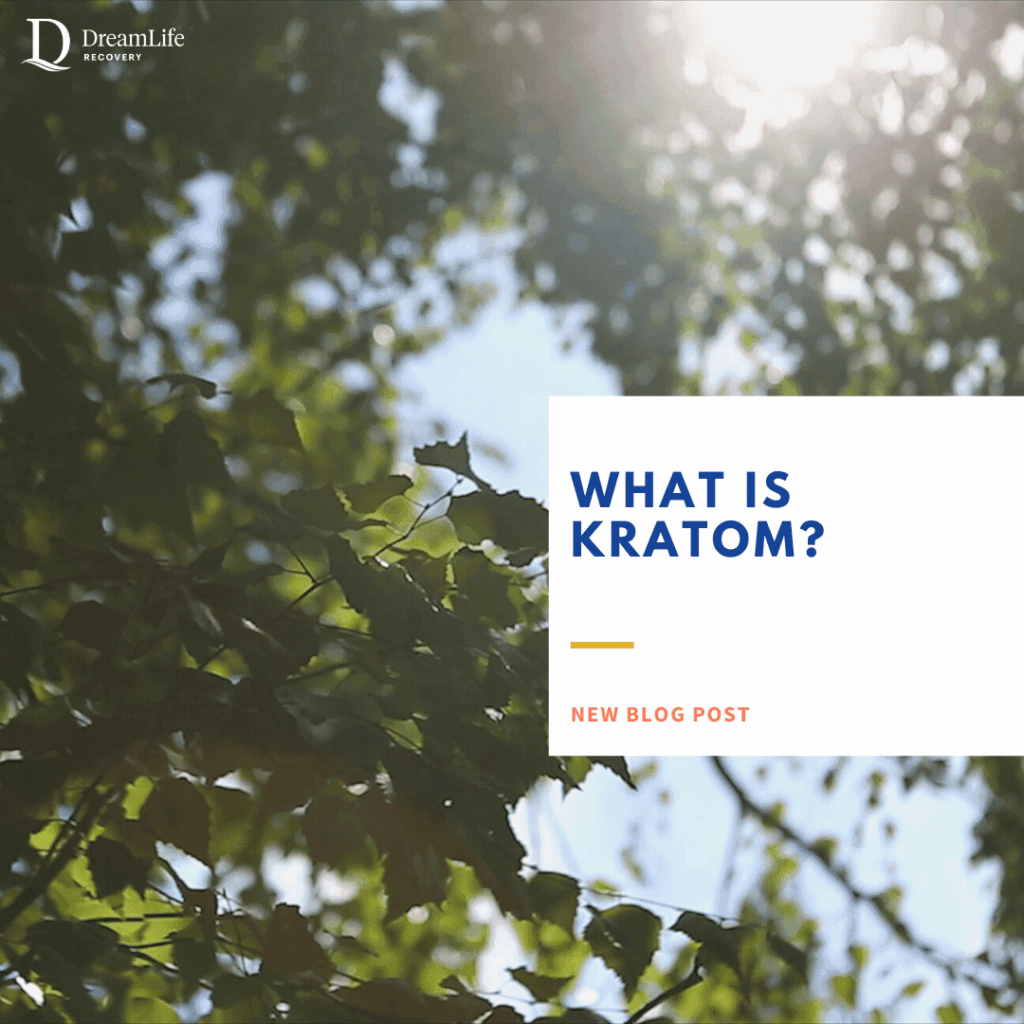Kratom is an herb that comes from the tropical tree, Mitragyna speciosa, native to Southeast Asian regions such as Thailand, Malaysia, Indonesia, and Papua New Guinea. Kratom can be ingested as a pill, capsule, or extract and sometimes comes in the form of a green powder. Kratom leaves can be dried or powdered and used as a tea, or added to food.
Originally used for medicinal purposes, kratom is not considered an illegal substance but has recently gained popularity as a recreational drug as it’s leaves contain substances that can be mind-altering and can get you high if abused.
Kratom leaves contain two compounds, mitragynine and 7-α-hydroxymitragynine, that interact with the brain’s opioid receptors. This produces feelings of pleasure, pain relief, and sedation when large amounts are consumed. This is why kratom is considered to cause effects that are similar to both opioids and stimulants. Consumed in small amounts, the herb can increase energy, alertness, and energy, similar to stimulants.
[cta id=”city”]Kratom’s Rising Popularity
In recent years, kratom has become more popular for pain relief and as an alternative treatment to control withdrawal symptoms from substance abuse, although this has not been medically proven.
According to NBC News, approximately 15 million people use kratom in the U.S. alone. It has grown in popularity for temporary pain relief, easing withdrawal symptoms from substance abuse, and helping with depression and anxiety. The more you use, the more it treats pain while the less you use, the more energy and stimulation it provides.
Is Kratom Safe?
Like most other substances with medicinal purposes, it’s important to be aware of how much kratom one may consume. Kratom has not been FDA-approved for any uses and in fact, the FDA has mounting concerns about it. There still needs to be a lot of research done surrounding kratom and its effects and addictiveness.
Kratom Side Effects May Include:
- Dry mouth
- Constipation
- Nausea
- Sweating
- Itching
- Loss of appetite
- Increased urination
- Hallucinations
- Seizures
These side effects can range anywhere from mildly uncomfortable to dangerous.
While there isn’t definitive evidence if a person can overdose on kratom on its own, there have been reports of deaths where kratom may have been ingested in addition to other substances. Data from the National Poison Data System in 2019 showed that from 2011-2017, there were 11 deaths involving kratom. Nine out of the 11 deaths involve other substances such as alcohol, benzodiazepines, caffeine, cocaine, diphenhydramine, and fentanyl. In 2017, the FDA found 44 deaths involving kratom, with at least one of them resulting from the ingestion of pure kratom In addition to the previously mentioned substances, gabapentin and medications such as over-the-counter cough syrups have been a deadly combination when mixed with kratom.
The Future of Kratom
As of right now, any medical claims touting kratom as a fix-all are not backed by scientific evidence as more testing needs to be done. The future of kratom is unclear but the District of Columbia and six states—Alabama, Arkansas, Indiana, Rhode Island, Vermont, and Wisconsin—have all banned kratom. The FDA has previously issued strong warnings against kratom, stating that “[The] FDA is concerned that kratom, which affects the same opioid brain receptors as morphine, appears to have properties that expose users to the risks of addiction, abuse and dependence.”
If you or someone you love needs help coping with the effects of withdrawal from substances such as drugs, alcohol, or kratom, contact DreamLife Recovery today.
Resources:
- NIDA. “Kratom DrugFacts.” National Institute on Drug Abuse, 8 Apr. 2019, https://www.drugabuse.gov/publications/drugfacts/kratom Accessed 12 May 2021
- Kratom: Unsafe and Ineffective – MayoClinic; 3 June 2020
- Chang-Chien GC, Odonkor CA, Amorapanth P. Is Kratom the New ‘Legal High’ on the Block?: The Case of an Emerging Opioid Receptor Agonist with Substance Abuse Potential. Pain Physician. 2017 Jan-Feb;20(1):E195-E198. PMID: 28072812
- Tanna RS, Tian DD, Cech NB, Oberlies NH, Rettie AE, Thummel KE, Paine MF. Refined Prediction of Pharmacokinetic Kratom-Drug Interactions: Time-Dependent Inhibition Considerations. J Pharmacol Exp Ther. 2021 Jan;376(1):64-73. doi: 10.1124/jpet.120.000270. Epub 2020 Oct 22. PMID: 33093187; PMCID: PMC7745086
- Diep J, Chin DT, Gupta S, Syed F, Xiong M, Cheng J. Kratom, an Emerging Drug of Abuse: A Case Report of Overdose and Management of Withdrawal. A A Pract. 2018 Apr 15;10(8):192-194. doi: 10.1213/XAA.0000000000000658. PMID: 29652682






